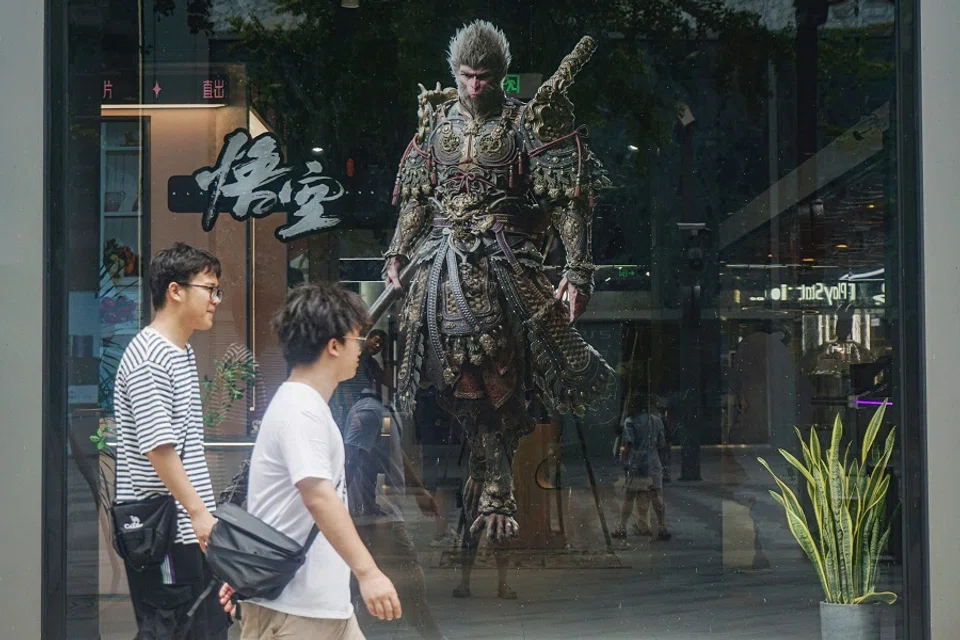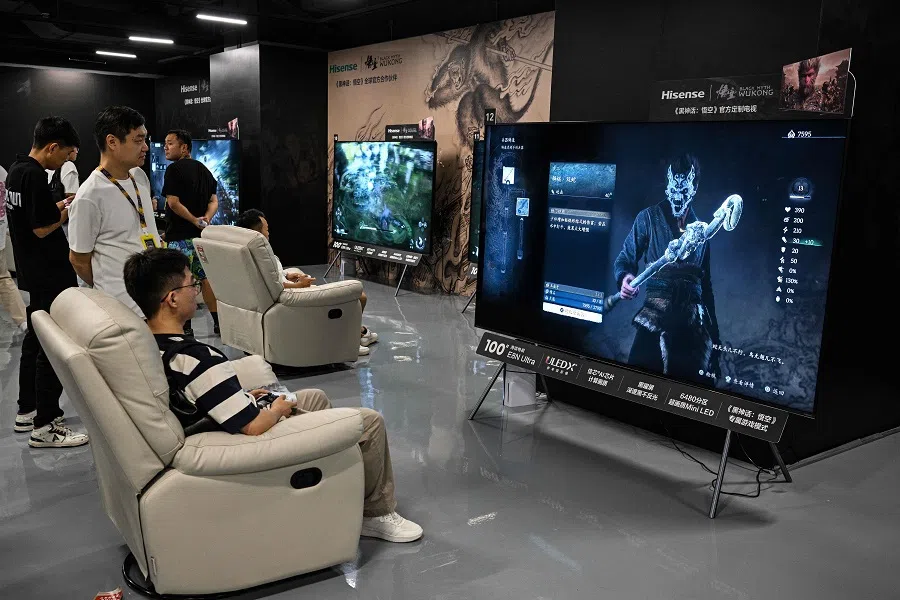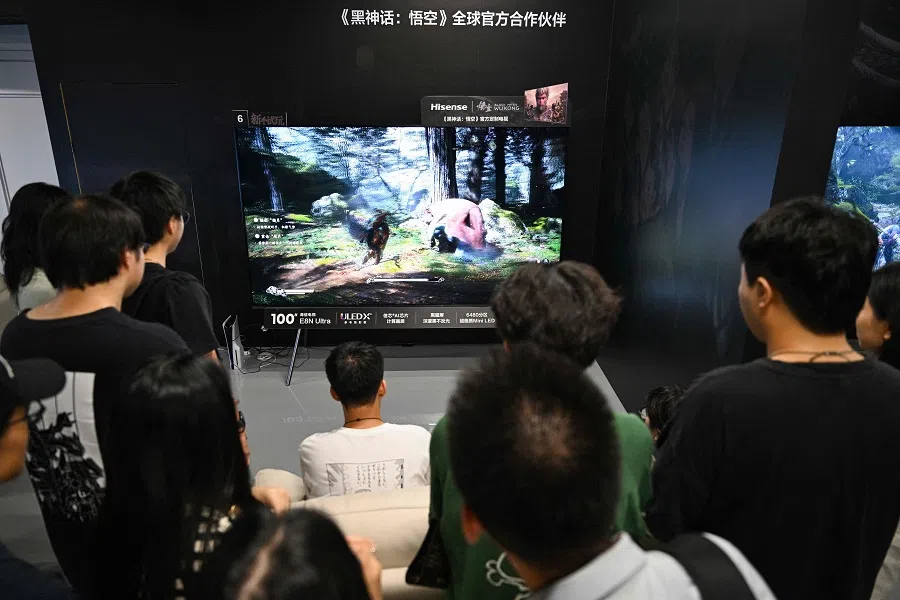Can Wukong blaze a new trail for the Chinese gaming industry?
Cultural industry worker Ding Yiming takes a look at the recent success of China’s latest release, Black Myth: Wukong, along with the twists and turns of the domestic gaming industry.

China-made single-player video game Black Myth: Wukong unexpectedly caught widespread attention in China and abroad, capturing the interest of the Chinese authorities and the general public.
The image of the Monkey King is leaping to the top of mainstream searches in China, while gaming livestreams are frequently pushed to the users’ screens via big data algorithms. Even the usually solemn state media have joined in, discussing the triple-A gaming masterpiece through the lens of “cultural confidence”.
Perhaps the recent excitement surrounding Wukong is fuelled by the novelty of a new release and the shock of its groundbreaking elements. Yet, defining the game’s success through a “cultural confidence” lens may be more of an emotional outburst than a rational analysis.
Outside of emotions, what revelations can this stunning domestic gaming masterpiece bring to relevant individuals and organisations in China?
A difficult start
If we want to discuss emotions, it is more meaningful to revisit the passion and grandeur of the early days of Chinese game developers and the gaming industry, rather than focusing solely on “cultural confidence”. The struggles and ideals of these predecessors may finally bear fruit because of Wukong.
From the 1990s to the turn of the century, the gaming industry was on the rise in Europe, the US and Japan. Pioneers of the era passionately led the charge, inspiring the first generation of Chinese game developers to join the movement.

That generation of Chinese game developers was driven by great ambition and determination, vowing to stay on par with the world and not be outpaced by international peers in the emerging electronic entertainment era, where they had every right and opportunity to be on equal footing.
The prevailing social concerns about “wasting time on trivial pursuits” tarnished the reputation of games...
Several outstanding China-made single-player games were created during that era. The domestic game developers naturally chose themes that draw from familiar Chinese culture, such as Heroes of Three Kingdoms, Sword Heroes Fate, Prince of Qin and Three Kingdoms: Fate of the Dragon.
The quality (gameplay and visual effects) of the games produced in the same period was also on par with their foreign counterparts — the smooth gameplay and spectacular combat scenes of Metal Knight made players back then appreciate the dedication of their homegrown game developers.
However, that generation of Chinese game developers faced numerous discouraging obstacles. The prevailing social concerns about “wasting time on trivial pursuits” tarnished the reputation of games, while the emerging market and the sluggish purchasing power of its main consumers drained the vitality of the industry.
Piracy the ‘final boss’
Most importantly, piracy loomed over the industry. Original game disks that cost around 198 RMB (about US$28), 128 RMB, 68 RMB, and even 48 RMB and 28 RMB back then could never compete with the allure of those sold at Wudaokou in Beijing that cost 10 RMB or 5 RMB apiece, not to mention virtual drives and free downloads.

I remember reading the passionate words of a game editor when I was a teenager. He noticed that when using NJStar Chinese WP (a Chinese word processor that converts between different encodings because many games at the time used the Big5 encoding system from Taiwan, which often caused garbled text on mainland China’s GB encoding system), the characters Cao Cao (曹操) in video game Sangokushi Sousouden would sometimes fail to convert properly, and “adamantly” show up as a garbled version of the characters bian ju (变巨).
He lamented, while developers could create a Big5-encoded version specifically for the market on the other side of the Taiwan Strait, does the massive gaming community on this side of the Taiwan Strait have to solely rely on NJStar Chinese WP and settle for the characters bian ju?
Over time, the industry’s self-neglect and decline became a self-fulfilling prophecy, reinforcing the traditionalists’ view of video games as “electronic heroin”.
The harsh reality that this editor lamented changed nothing despite the numerous calls for change from industry practitioners and gaming enthusiasts. It was further shattered amid the raging flames of the Lanjisu internet cafe fire (an arson committed on 16 June 2002 that resulted in the deaths of 25 people).
Countless game developers gave up on their crushed dreams, and even abandoned the big project of developing domestic single-player games. Those who remained active turned to the emerging world of online games.
Afterwards, unable to conquer the “final boss” of piracy, China’s gaming industry developed in a distorted manner for many years, becoming entirely focused on online games, which were less affected by piracy.
In online games, the “pay-to-win” model (known as 氪金 or kejin, meaning to spend real money directly or indirectly on virtual items to gain an advantage over other players) became favoured by industry operators. Over time, the industry’s self-neglect and decline became a self-fulfilling prophecy, reinforcing the traditionalists’ view of video games as “electronic heroin”.

In the midst of a gloomy Chinese single-player gaming industry, the highly anticipated Wukong has made a breakthrough, punching a hole in a 20-year stagnation.
Although today’s player base has become disconnected from the ideals and passions of the early Chinese game developers, the impact and excitement that the Monkey King brings may be an extension of the pioneering single-player games at the turn of the century.
‘Cultural confidence’ lends helping hand
The voices in the Chinese media that attribute the success of Black Myth: Wukong to cultural confidence should not be taken at face value, nor should they be completely dismissed.
They should not be taken at face value because the success of a single-player game ultimately depends on its playability, visual appeal and profitability, with cultural elements being secondary.
Emotional concepts such as “cultural confidence” cannot replace rationality and technology, but in today’s rising Chinese gaming industry, it may be able to “lend the Monkey King a helping hand”.
Playability refers to the smoothness of gameplay, loading speed, the depth of content that can be explored to keep players interested, and the difficulty level that meets the needs of different players — neither too difficult to be hopeless, nor too easy to be boring.
Visual appeal pertains to the game engine, visual rendering and graphics card used, as well as the colour palette, brightness, contrast, character design, environment design and lighting design, all of which contribute to the visual enjoyment of the game. In today’s era of rapidly advancing display resolution, this aspect is becoming increasingly important.

Both of these aspects require game developers to invest real effort during the development stage, without cutting any corners. The principle for developers is that one unit of effort is a chance to get one unit of return. However, this is not guaranteed, so developers need to manage their expectations in relation to how the game will have the opportunity, channel and platform to generate economic returns after its release, and have this expectation as an incentive for their massive investment. Both are indispensable.
Therefore, the question of how the game is marketed and sold, and through which channels or platforms, constitutes the game developer’s expected possibility of profit. The Steam platform or home console platform can effectively prevent piracy, providing a possible solution to this threat. The growing purchasing power of players is also a source of income.
The three above-mentioned key elements of single-player game success are all rational and technical, requiring a rational and technical perspective. Emotional concepts such as “cultural confidence” cannot replace rationality and technology, but in today’s rising Chinese gaming industry, it may be able to “lend the Monkey King a helping hand”.
Needs full support
In the context of China’s gaming industry, which is inherently inadequate and faces disapproval of values domestically and strong competitive pressure externally, Black Myth: Wukong has put on the golden armour of “cultural confidence”, so that even the official media, which has always adhered to its fundamentalist values, is praising it.
Perhaps, it could offer an opportunity to open up the narrow path for the domestic single-player game industry.
Only with the consistent support of China, from civil society to the authorities, can the Chinese gaming industry, especially world-class single-player games, have a chance to succeed.

The recovery of the gaming industry depends on the factors mentioned earlier, as well as the support (at least no suppression) of relevant management units and regulation of the market (especially against piracy).
Only with the consistent support of China, from civil society to the authorities, can the Chinese gaming industry, especially world-class single-player games, have a chance to succeed. “Cultural confidence” may be able to blaze a trail and provide assistance.
China is encouraging the development of “new quality productive forces” — of which diversified industrial development should be an integral part, given today’s global competition and domestic industrial landscape changes.
Precisely because developing games can also “demonstrate cultural confidence”, it should no longer be seen as a redundant or even harmful thing. The Chinese gaming industry deserves a rightful place among the “360 industries”.
This article was first published in Lianhe Zaobao as “文化自信以外的悟空”.



![[Video] George Yeo: America’s deep pain — and why China won’t colonise](https://cassette.sphdigital.com.sg/image/thinkchina/15083e45d96c12390bdea6af2daf19fd9fcd875aa44a0f92796f34e3dad561cc)
![[Big read] When the Arctic opens, what happens to Singapore?](https://cassette.sphdigital.com.sg/image/thinkchina/da65edebca34645c711c55e83e9877109b3c53847ebb1305573974651df1d13a)
